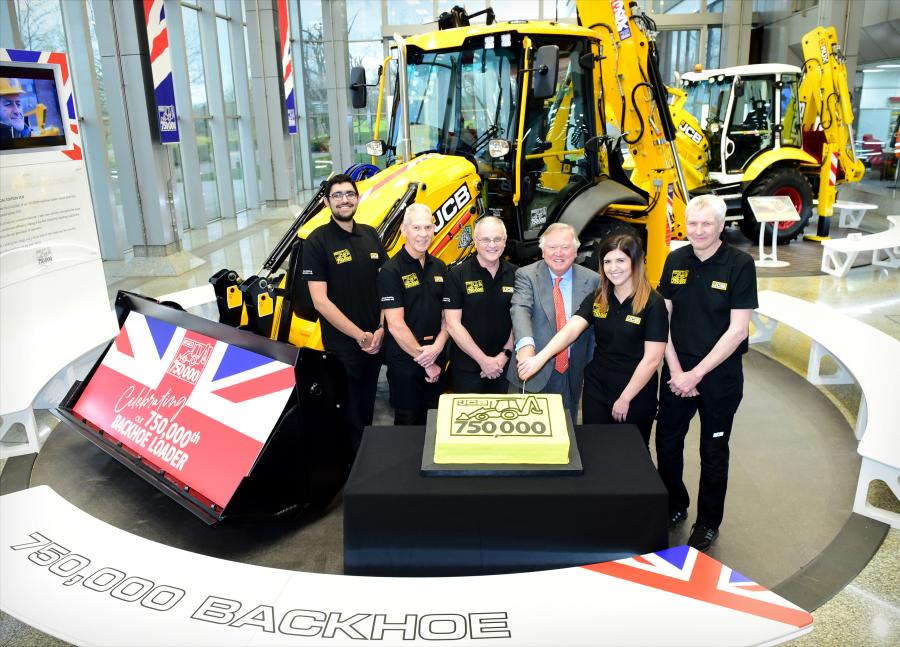JCB was founded on Oct. 23, 1945, by the late Joseph Cyril Bamford in a tiny lock-up garage in the Staffordshire market town of Uttoxeter in the UK.
It was the same day his son Anthony, now Lord Bamford, was born, and as Bamford remarked "being presented with a son tended to concentrate the mind and when you were starting at the bottom, there was only one way to go and that was up."
The foundation for the growth that was to follow was the manufacture of a tipping trailer made from war time scrap, which today stands proudly in the showroom of JCB's World HQ.
It was produced in his garage and sold for £45 at the town's market. The buyer's old cart was also taken in part exchange and Bamford refurbished it and sold for another £45 – achieving the original asking price of the trailer.

1945 - Mr JCB's first product, a tipping trailer made from war time scrip.
By 1947 the company was expanding and because Bamford's landlady also disapproved of his Sunday working, he moved a few miles down the road to a stable block at Crakemarsh Hall, which was owned by Julia Cavendish, a survivor of the Titanic disaster. JCB also hired its first ever full-time employee, Arthur Harrison, who became foreman.
By 1950 JCB was on the move again, this time to the site of a former cheese factory in Rocester. The location had been identified by Bill Hirst, who revelled in the fact his workplace was now closer to home and enabled him to "spend an extra 10 minutes in bed." Hirst had joined JCB as a £1-a-week teaboy in 1947. He rose through the ranks to become service director.
1953 proved to be a pivotal year for new products when Bamford invented the backhoe loader with the launch of the JCB Mk 1 excavator. It was the first time a single machine had been produced with a hydraulic rear excavator and front mounted shovel. This ingenuity still bears fruit today: JCB has manufactured more than 600,000 backhoes and they are now made on three continents.
1953 also was the year that the famous JCB logo -- recognized the world over -- was first used on a machine and it was eventually registered as a trademark five years later.
With the launch of a range of new backhoes, by the time the 1960s arrived it was clear this machine was revolutionizing the building industry, increasing productivity and reducing reliance on manpower.
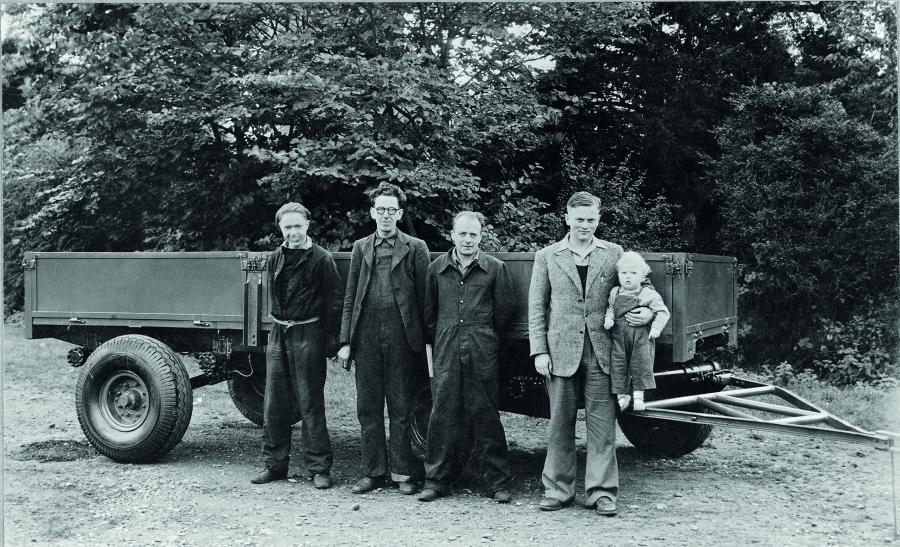
1947 - Anthony Bamford in his father's arm. (L-R) are employees Bill Hirst, Arthur Harrison and Bert Holmes.
As the new decade dawned, the company also was harnessing new tools to generate business and promote the brand.
In 1961, JCB Aviation was formed and the company's first ever plane, a twin-engine de Havilland Dove made its inaugural flight, with customers from Europe now able to make a return visit to the factory in a single day. JCB Aviation is older than many of today's airlines.
It was in 1962 that the JCB Dancing Diggers first took a bow and JCB's first ever overseas subsidiary in Holland was opened. A year later the JCB 3C backhoe, an acknowledged design classic, was launched. Such was the growing success of the company that in 1964, with sales up by 60 percent to £8 million, employees shared in a £250,000 bonus. The news made national headlines and payouts were on such a scale that some employees were able to buy their first homes with the bonus they received.
Bamford declared: "I am giving you this money because I want you to share in the success of the company you have helped make."
In the same year, JCB exported its first ever machine to the USA – a JCB 4C backhoe loader.
In 1969, JCB produced a record 4,500 machines and by now was exporting more than half of them. It was in recognition of this export success, that the company received in this year its first ever Queen's Award – the first of 27 such accolades. It was a year for awards as Bamford became a Commander of the British Empire (CBE) in honor of the company's export achievements.
As 1970 dawned, JCB opened up for business in the United States, setting up a base in Whitemarsh, Baltimore, Md., to harness the huge growth opportunity North America offered.
Between 1971 and 1973 sales doubled to £40 million. In 1975 JCB's Founder retired, telling staff in a farewell message: "Anthony faces the tough job of moving JCB forward through the next decades into a new century. This is a demanding task, but he has been well trained for it and is supported by a very strong team from works staff to management. There cannot be any limit to the successes."
And so, a new era had dawned -- and one that would see huge expansion of both manufacturing facilities and product ranges.
It started in 1972 with the opening of JCB France. In 1977 the wraps came off the Loadall telescopic handler, a machine which revolutionized the way loads were handled on both construction sites and on farms. The Loadall has gone on to be one of the most successful products in JCB's history.
1977 also marked the start of several high-profile visits to JCB by members of the British Royal Family when HRH The Prince of Wales toured the Rocester factory.

1977 - the launch of the 520 telescopic handler revolutionized the placing and handling of loads.
A year later another landmark was achieved: the construction of JCB's second factory in the UK, JCB Transmissions in Wrexham.
But it was the decision to start manufacturing in India in 1979 that heralded a period of global expansion as Anthony Bamford spotted the potential of this market. Today JCB has factories in New Delhi, Pune and Jaipur and India is now JCB's biggest market behind the UK.
Product innovation continued to be the lifeblood of the company and in 1985 the 3CX Sitemaster backhoe loader was launched and went on to be JCB's biggest-ever selling backhoe. It's also the year JCB celebrated the production of its 100,000th backhoe.
1986 was a milestone year for JCB's charitable work when the children's charity the NSPCC became the company's nominated charity. It was then that Carole Bamford, now Lady Bamford, instigated the setting up of an NSPCC fund raising committee when her three children were young. To date JCB and its employees have raised millions of pounds for the NSPCC.
In 1987, Britain's first female Prime Minister Margaret Thatcher visited JCB's World HQ and drove a machine off the production line. Ecstatic crowds greeted her and one member of the public planted a kiss on the cheek of the woman dubbed "The Iron Lady" as she toured the facility.
In 1988, the wraps came off the JCB GT, a backhoe capable of 100 mph and a fantastic promotional tool which continues to draw the crowds wherever it appears around the world.
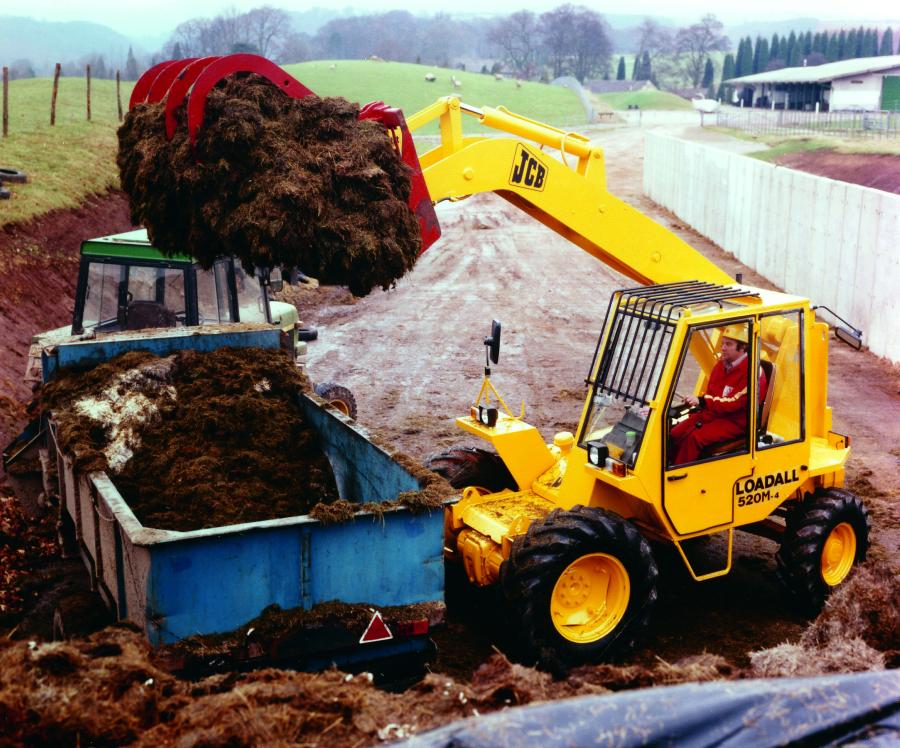
1980 - JCB's Loadall range expands with the launch of the 520M model.
By 1990, JCB was expanding into new fields with the launch of the JCB Fastrac tractor -- the world's first genuine high-speed, full suspension tractor. It cost £12 million to develop and took the world of agriculture by storm. It also was the year that Anthony Bamford was knighted by HM The Queen and became Sir Anthony Bamford, an honor he said "recognized the efforts of the whole JCB team." To celebrate, JCB employees were given an extra day of vacation.
Product development continued unabated with the launch of the 2CX backhoe loader in 1990 followed three years later by the even smaller 1CX.
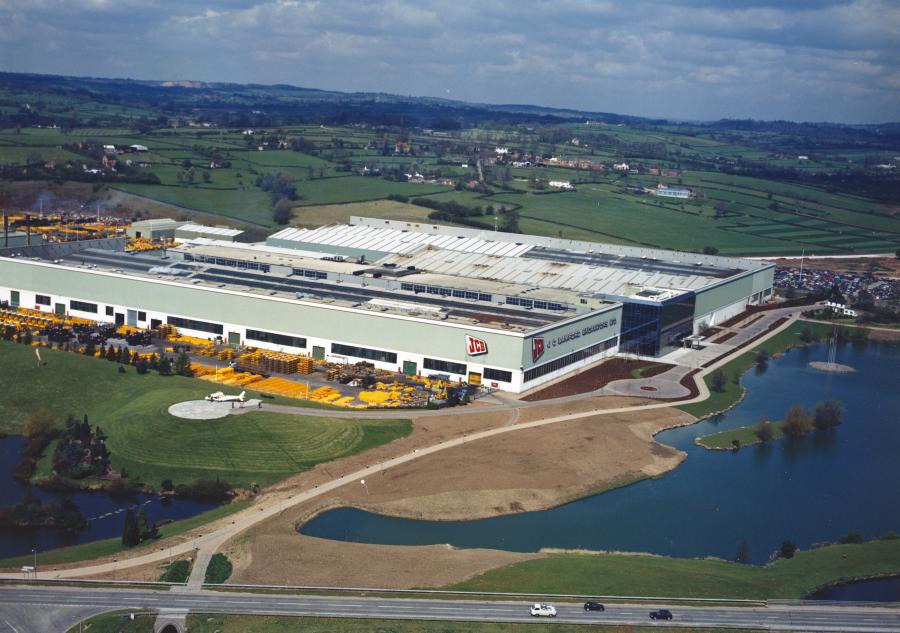
1987 - a shot of JCB's World Headquarters from the air.
In 1994, Joseph Cyril Bamford had a rose named in his honour. Called "Mr. JCB", the yellow rose was unveiled in the presence of HM The Queen at the Chelsea Flower Show.
A year later and JCB was celebrating its 50th anniversary with a visit by HM The Queen to its World HQ, where she unveiled a replica of the Uttoxeter garage where Bamford began his business all those years ago.
Future Labor Prime Minister Tony Blair visited in 1996 and helped assemble a 4CX and in 1997 the innovative Teletruk forklift -- which can lift and place loads over obstacles -- was launched. In 1998, JCB opened its second factory in Wrexham, Wales, and a year later opened JCB Earthmovers in Cheadle, Staffordshire. In 2000, the first machines began rolling off the production line at JCB's new North American headquarters in Savannah, Ga.
On March 1, 2001, flags at JCB factories around the world flew at half-mast following news of the death of the company's Founder Joseph Cyril Bamford. Britain's Financial Times newspaper said he was blessed with a rare combination of "engineering genius and marketing flair."
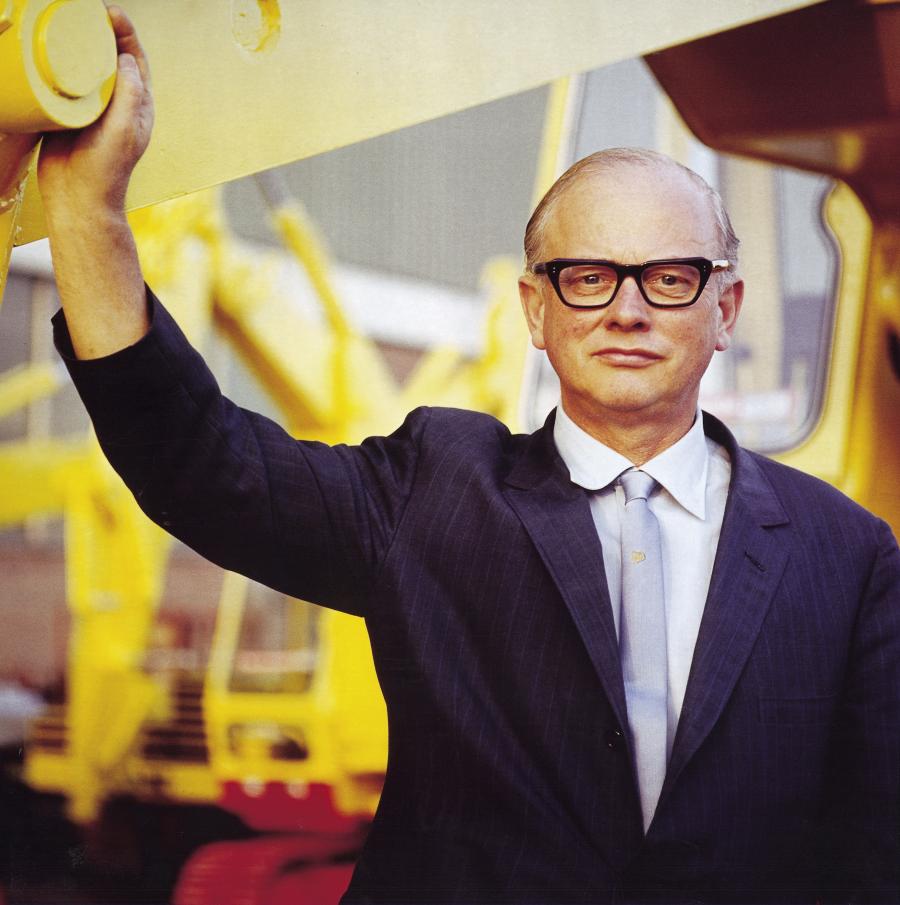
Joseph Cyril Bamford
In 2001, JCB expanded its charitable work with the setting up of the Lady Bamford Charitable Trust in India with the adoption of a school a few hundred yards from JCB's factory in Ballabgarh, near New Delhi.
In 2004, employees gathered at the World HQ for a commemorative photo to mark the production of the 500,000th machine. It had taken just short of 60 years to reach that milestone. The next half million machines would be produced in the next nine years. It also was the year that JCB took the bold step into engine production with the launch of the Dieselmax engine, manufactured at JCB Power Systems in Derbyshire.
In 2005, JCB opened its factory in Pudong, China, and announced news of the biggest ever order in its history, a $140 million deal to supply the U.S. Army with a high-speed backhoe loader for military engineering tasks, a machine known as the High Mobility Engineer Excavator (HMEE). In 2006, Sir Anthony Bamford's son Jo became a director of JCB, the third generation of the Bamford family to hold such a position.
This year also saw JCB set a world record with the JCB Dieselmax streamliner car. Powered by two JCB Dieselmax engines, it reached speeds of 350.092 mph on the Bonneville Salt Flats to attain the record of the world's fastest diesel car, a title it still holds today. Sir Anthony Bamford joined the team on the Salt Flats to celebrate the successful outcome of his idea.
JCB's support of underprivileged children spread further around the globe with the opening in 2007 of the Lady Bamford Center for Early Childhood Development in Savannah, Ga., to support the education and social development of pre-school children. It was in this year that JCB achieved its highest ever machine sales of 72,000 units.
Meanwhile, in 2008, JCB Heavy Products -- which manufactures tracked and wheeled excavators -- moved to its brand-new factory on the outskirts of Uttoxeter. This was followed in 2009 by a £40 million investment in JCB's factory in Ballabgarh, India, to create the world's biggest backhoe loader factory.
In 2009, HRH Prince William followed in his father's footsteps of 32 years earlier when he toured the company's headquarters and helped employees celebrate the production of the 750,000th machine.
A national shortage of engineers inspired Lord Bamford establish the JCB Academy in Rocester, Staffordshire, in 2010 to train the country's engineers and business leaders of the future. The facility has been a resounding success with nearly 1,000 students passing through its doors and with every single one going on to employment or further education.
JCB also announced a $40 million project to develop a brand-new range of skid steer and track loaders to be manufactured at its North American HQ.
As it looked to the future, JCB also celebrated its heritage with the opening of the "Story of JCB" in 2011, a permanent exhibition marking the growth of JCB and the Bamford family's roots in industry. These roots can be traced back almost 200 years when they started out as blacksmiths in Uttoxeter, before, in 1871, they founded agricultural machinery suppliers Bamfords Ltd in the town.
Global manufacturing extended to Brazil in 2012 and British Prime Minister David Cameron officially opened the new £63 million facility in Sao Paulo state. This year JCB also celebrated securing a £60 million order for more than 1,000 backhoes from the Brazilian Government.
As JCB approached its 68th birthday in 2013, a new independent economic report revealed the company supported 24,000 jobs in the UK and contributed £545 million to the British Exchequer. Hundreds of employees also gathered outside the world HQ for a commemorative photograph marking the production of the one millionth JCB machine. It also was a momentous year for JCB's Chairman Sir Anthony Bamford as he became Lord Bamford after being invited by Prime Minister David Cameron to be a Conservative working peer in the House of Lords – prompting hundreds of messages of congratulation to flood in from around the world.
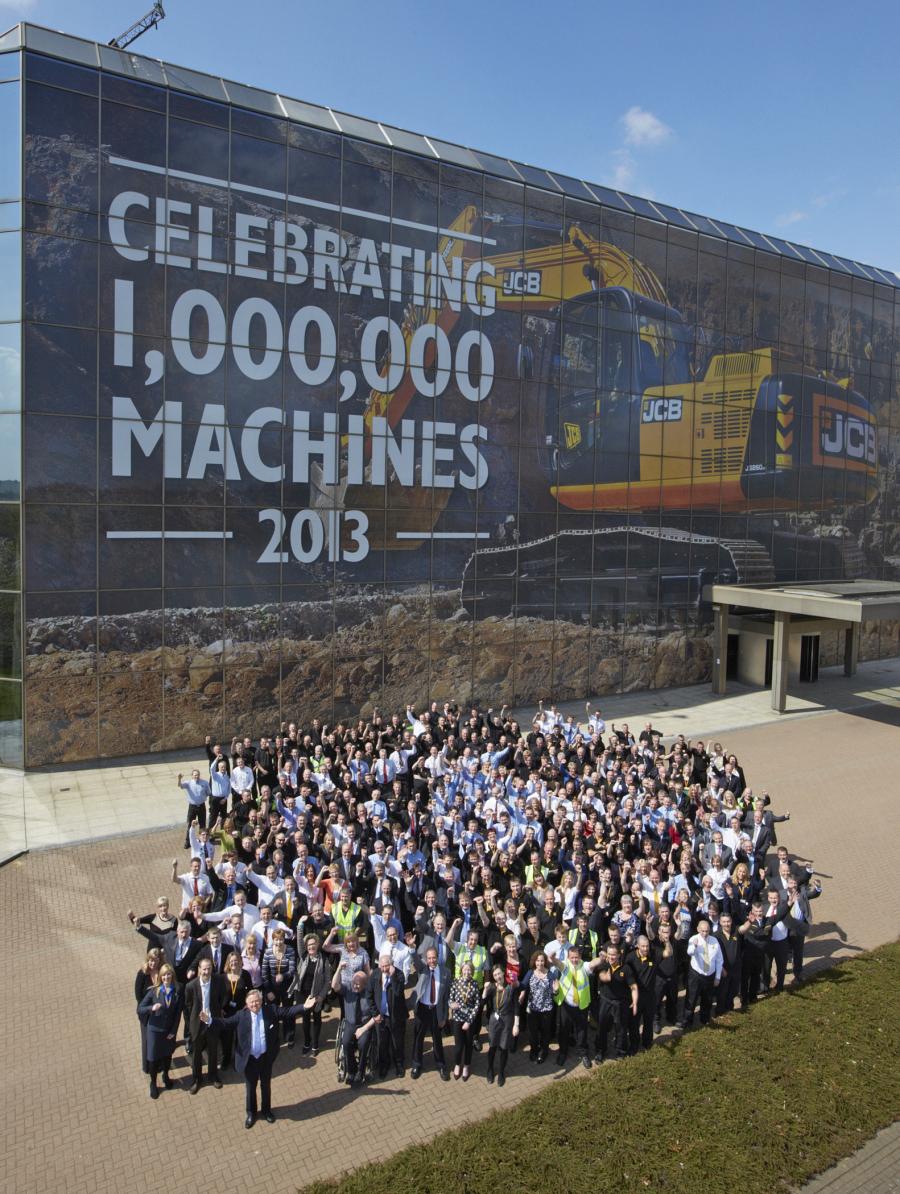
2013 - employees celebrate the production of JCB's one millionth machine.
In 2014, Lady Bamford presented a check for £2 million to HRH The Countess of Wessex for the NSPCC after a marathon company-wide funding raising drive. Employees raised £1 million and the amount was doubled by Lord Bamford. In India, production started at JCB's new £62 million Jaipur factory complex and plans were announced for a £20 million new HQ for JCB Germany in Cologne.
In 2015, JCB marked its 70th anniversary with a continued focus on product innovation as the wraps came off the brand new 3CX Compact backhoe loader, a machine 35 per cent smaller than its bigger brother and designed to work on increasingly congested building sites.
2016 was a year of milestones as the company celebrated the production of the 200,000th Loadall telescopic handler. It took almost 30 years for JCB to sell the first 100,000 Loadalls but it has taken less than 10 for the next 100,000 to be sold -- testament to the growing importance of the product and JCB's strength in this sector. Today JCB is the world's number one producer of telescopic handlers. In this year JCB also marked the production on its 100,000th mini excavator and celebrated 25 years of production of the revolutionary Fastrac tractor. It also was the year when the new JCB Hydradig was launched to international acclaim.
2017 also was a momentous year on two fronts: the launch a new range of JCB powered access equipment after two years of secret development. JCB was entering for the first time a market worth $8 billion a year. The year also saw the company celebrate another Loadall milestone -- 40 years since production started. Later in the year JCB marked the production of its 500,000th engine -- enough engines to stretch from London to Paris.
If 2017 was a year of milestones, 2018 was certainly a year for exciting product introductions with the unveiling of JCB's first ever electric excavator leading the way. The 19C-1E electric mini excavator was developed in response to customer demands for a zero emissions machine which could work indoors, underground, and close to people in urban areas. Once fully charged, it is ready to put in a full normal working day on the building site. The year also saw the launch of the hugely successful X-Series range of tracked excavators and the start of site dumper manufacturing at the World HQ in Rocester. JCB also announced a £50 million investment in a new factory to produce cabs in Uttoxeter.
By 2019, the new electric mini excavator was in full production at JCB Compact Products in Cheadle, Staffordshire, with the initial first 50 orders delivered to customers. It also was a year for records. In June of that year, JCB set a Guinness World Record for the fastest tractor at Elvington Airfield in Yorkshire. Called Fastrac One, the tractor reached a speed of 103.6 mph with motorbike racer and truck mechanic Guy Martin in the driver's seat. JCB then embarked on an ambitious plan to break its own record and developed Fastrac Two -- which is 10 percent lighter and even more streamlined than its smaller brother. In October, Fastrac Two hit an astonishing peak speed of 153.771 mph on its way to recording an average of 135.191 mph at Elvington. In 2019, Chairman Lord Bamford officially opened a brand new £50 million headquarters for JCB Germany.
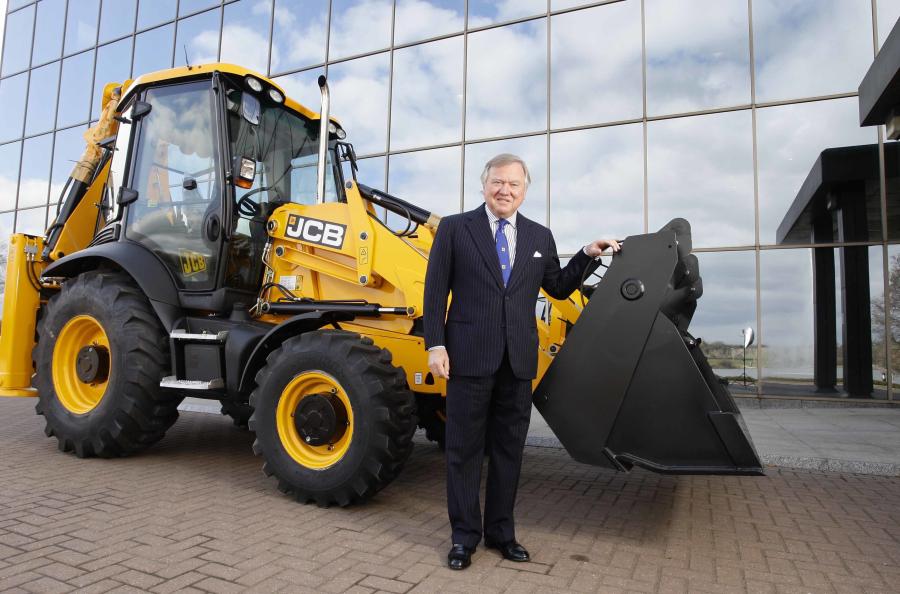
Lord Bamford
As JCB entered its 75th anniversary year, the sad news was conveyed in January that Bill Hirst, the third employee recruited by the company in 1947, had died at the age of 86.
In March 2020, JCB marked the production of the 750,000th backhoe loader before the world became a very different place as the COVID-19 pandemic took hold. When the company's production lines fell silent in March, JCB turned its attention to helping those in need during the unprecedented times.
In India and the UK, company chefs prepared more than 200,000 meals for those most in need. A Staffordshire production line closed because of the Coronavirus crisis was re-opened to produce prototypes of special housings for a new type of ventilator following a national call to action.
JCB also reopened its Innovation Center at the World HQ in Rocester so that employees could volunteer to make medical grade visors for NHS staff on the company's 3D rapid prototype machines.
By the time production lines re-opened in June, JCB also was previewing an exciting new development after developing the construction industry's first ever hydrogen powered excavator as JCB continued to lead the sector on zero and low carbon technologies. The 20-tonne 220X excavator powered by a hydrogen fuel cell has been undergoing rigorous testing at JCB's quarry proving grounds for more than 12 months. The exciting development means JCB is the first construction equipment company in the world to unveil a working prototype of an excavator powered by hydrogen, considered by many to be the fuel of the future.

2020 Happy birthday JCB ....machines spell out the signifcant milestone.
Today's top stories



